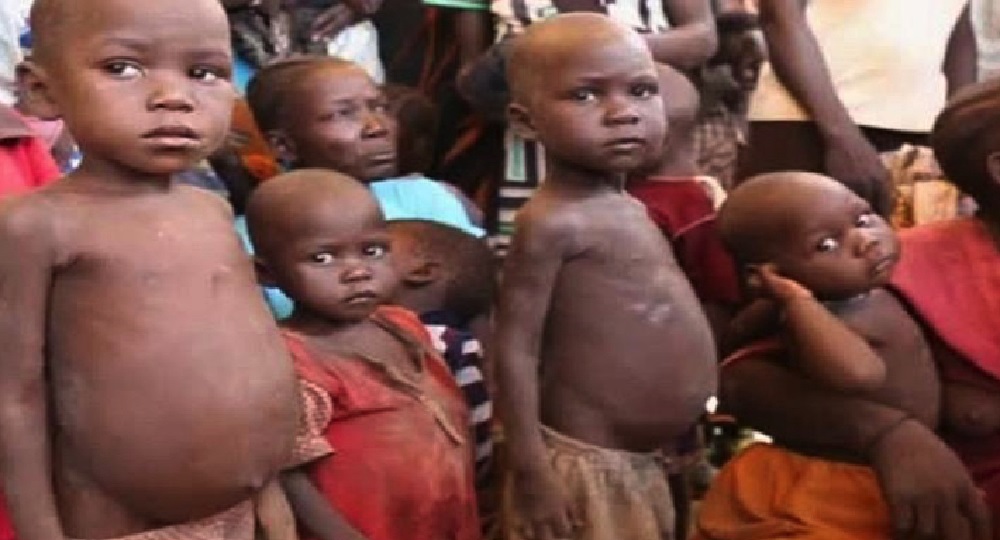Health
‘195,000 cases, over 1,900 deaths’ – WHO announces global resurgence of cholera

The UN World Health Organisation (WHO) has announced a spike in cholera in several regions of the world, with almost 195,000 cases and over 1,900 deaths reported in 24 countries since the start of this year.
The agency’s Eastern Mediterranean Region reported the highest number of cases, followed by the African Region, the Region of the Americas, the Southeast Asia Region, and the European Region.
WHO, in a statement on Thursday, stated that there are no reported cases in the Western Region, according to its bulletin released on Wednesday.
The UN health agency said it exhausted its global stockpile of Oral Cholera Vaccines (OCV) by March but was able to exceed “the emergency target of five million doses in early June for the first time in 2024.”
Yet, the supply of the vaccine does not equate to its demand.
WHO reported that since January last year, 16 countries requested 92 million doses of OCV – almost double the 49 million produced during that time.
WHO, the UN Children’s Fund (UNICEF) and other partners are working together to use resources to find long-term solutions for cholera.
On the positive side of health news, WHO announced on Thursday that Chad successfully eradicated “sleeping sickness” as a public health problem.
The agency applauded the Government and people of Chad for eradicating the gambiense form of human African trypanosomiasis, (also known as sleeping sickness).
“I congratulate the government and the people of Chad for this achievement.
“It is great to see Chad join the growing group of countries that have eliminated at least one neglected tropical disease (NTD),” Tedros Ghebreyesus, WHO Director-General, said.
Tackling the cholera outbreak
In eliminating the disease, Chad joining some 50 others globally that have succeeded in this endeavour.
“The 100-country target is nearer and within reach,” Ghebreyesus, added, referring to the target set out in the road map for address neglected tropical diseases by 2030.
Sleeping sickness can cause flu-like symptoms initially but eventually causing behaviour change, confusion, sleep cycle disturbances or even coma, often leading to death.
Improved access to early diagnosis and treatment, as well as surveillance and response has proven that countries can control and eventually eliminate transmission.
Health
ANC: Why pregnant women with non-communicable diseases should register in teaching hospitals

By Francesca Hangeior
Maternal health experts have advised pregnant women with non-communicable diseases such as heart disease, hypertension, diabetes, and sickle cell disorder to register for antenatal care in teaching hospitals where they can get specialist care.
The gynaecologists noted that pregnancy among women with these health conditions was associated with high risk, especially during delivery, and therefore should be managed where there are specialists to avoid losing the baby or the mother or both.
The experts reiterated that pregnant women with those conditions needed to use tertiary hospitals for their ANC to reduce complications during and after birth.
A Consultant Obstetrician and Gynaecologist at the Nnamdi Azikiwe Teaching Hospital, Akwa, Anambra State, Dr. Stanley Egbogu, said pregnancy among women with co-morbidities comes with concern and lots of complications.
Egbogu said, “Women who have diseases like hypertension, diabetes, and heart disease before pregnancy must not use primary health centers for their antenatal care.
” It is important they register in a teaching or specialist hospital for their antenatal care because they need specialized care by experienced obstetricians and gynaecologists.
“If such women should visit PHCs for antenatal care, they should be referred to a teaching hospital immediately because they are prone to so many complications during pregnancy.”
The gynaecologist noted that people with hypertension could convulse during pregnancy.
“Those who have diabetes can have renal failure during pregnancy and delivery.
Those who have sickle cell disease can have anemia, and their blood can be so low that many of them have issues during delivery. For those who are asthmatic, pregnancy can worsen the asthmatic condition, and some of the drugs they use can affect the baby if not monitored.
“So, these women need specialised care and that cannot be offered at the primary healthcare level. The truth is that if those complications are not effectively managed, they could lead to the death of the woman or her baby”, he said.
Egbogu also advised the women to start antenatal care early and be regular at the antenatal clinic because “we want to see those that have problems more often than those that do not have problems.”
The Centres for Disease Control and Prevention says a woman with sickle cell disease is more likely to have problems during pregnancy that can affect her health and the health of the unborn baby than a woman without the disease.
During pregnancy, the disease can become more severe, and pain episodes can occur more often. A pregnant woman with SCD is at a higher risk of preterm labor, having a low birth weight baby, or other complications. However, with early prenatal care and careful monitoring throughout pregnancy, a woman with SCD can have a healthy pregnancy”, the CDC said.
According to the Asthma and Allergy Foundation of America, about 30 percent of all women with asthma report their asthma worsened while pregnant.
The foundation notes “Pregnant women with asthma may have a bit greater risk of delivering early. Or the infant may have a low birth weight. High blood pressure and a related condition known as pre-eclampsia are also more common in pregnant women with more severe asthma.”
Another maternal health expert and a Senior Registrar in the Obstetrics and Gynaecology Department at the Aminu Kano Teaching Hospital, Kano State, Dr. Mahmoud Magashi, says it is better and safer for pregnant women with co-morbidities to deliver in a specialist hospital to effectively manage associated risks both during and after delivery.
According to the World Health Organisation, in 2015, Nigeria’s estimated maternal mortality ratio was over 800 maternal deaths per 100,000 live births, with approximately 58,000 maternal deaths during that year.
But the Demographic and Health Survey 2018 showed that Nigeria’s latest maternal mortality ratio is 512 per 100,000 live births, which experts say is still very high.
Health
Psychiatrists link Nigerians’ declining happiness to economic hardship

By Francesca Hangeior
Psychiatrists have attributed Nigeria’s declining ranking in the World Happiness Report to worsening economic hardship, insecurity and political instability.
They warned that the rising cost of living and social instability was increasing anxiety, depression, and suicide rates among Nigerians, predicting a reduction in the country’s life expectancy rate.
The mental health experts who was speaking in an interview said that the inability of many citizens to afford necessities such as food, healthcare, and social interactions has significantly reduced happiness levels.
They noted that financial stress has prevented people from engaging in social activities that previously served as coping mechanisms, further worsening their emotional and mental well-being.
The experts urged the government to reverse the harsh economic situation and encouraged individuals to assist those in need and keep the hope alive.
On Thursday, March 20, the world marked the International Day of Happiness.
The Global Happiness Report released on Thursday by the Global Happiness Council ranked Nigeria 105th out of 147 countries.
The report evaluates happiness levels based on individuals’ assessments of their lives.
This year’s report showed that Nigeria, which used to rank the happiest African nation, now ranks 10th, dropping three steps from its usual position.
In 2003, the New Scientist magazine in the United Kingdom named Nigeria the happiest country in the world out of 65 countries surveyed.
In 2010, the Gallop World Poll also ranked Nigeria the happiest place on earth out of 53 countries surveyed.
Gradually, Nigeria’s rank began to drop as the years went by.
For example, before 2021, the World Happiness Report ranked Nigeria the sixth happiest country out of 155 countries.
But in 2024, the WHR placed Nigeria as the 102nd happiest nation out of 143 countries.
Speaking on the health and mental implications of the 2025 WHR, the President of the Association of Psychiatrists in Nigeria, Professor Taiwo Obindo, stated that the sad economic and socioeconomic realities of the country, insecurity situation and political difficulties were factors dwindling the happiness levels of many citizens.
He added that the lack of happiness could increase anxiety and depression levels, consequently causing a rise in death by suicide.
The don further noted that unhappy people were less likely to give their best at work or at home, leading to reduced economic output and a negative impact on the future of children in the country.
“The first question we need to ask ourselves is, what has driven us back, and then why we are where we are? What are the implications, is it the way and the manner in which things are going in the country? We are largely, generally, having difficulties economically, in terms of security, even politically. Things happening around us are not cheering.
“So, one won’t be too surprised that the cost of living is so high, the standard of living is so low, that people cannot afford to live a decent life,” Obindo said.
The APN president further stated that measures that previously helped Nigerians to socialise and be cheerful have become unaffordable, stating that these contributed to a drop in the country’s WHR.
The psychiatrist stated that a rise in unhappiness would lead to higher depression rates, which could, in turn, contribute to an increase in physical illnesses like high blood pressure.
“It affects virtually all parts of our body, all parts of our systems. And of course, those who are using one medication to control their blood pressure may need to do more. Of course, one of the things that I didn’t mention is that the costs of drugs have multiplied and a lot of people are not able to afford to buy some of the drugs for their medication. Therefore, situations are becoming more and more complicated.
“So, in all this, somebody who has hypertension and doesn’t have good control of it and needs more medication, because they cannot afford, may develop a stroke, may have a heart attack, and therefore, their life is cut short,” the don said.
The APN president further noted that the situation would reduce the life expectancy rate of Nigerians.
He warned, “It’s a vicious cycle and we need to have this reversed soon enough for people to go back to living their happy and their social life.”
Obindo urged the government to intervene and reverse the harsh economic situation to make life easy for Nigerians, stating that the high cost of things was becoming unbearable.
“At the community level, we must be our brother’s keeper. There are those who are more well-to-do, they must reach out, particularly in this particular season of fasting and lent. We must set up a good way of reaching out to people and the true less privileged around us.
“We must find a way of increasing job opportunities and making sure that the cost of living is reduced. We need to reverse the trend of pharmaceutical companies leaving the country.
“On the individual and family level, we must make sure that we don’t allow this situation to overwhelm us. We should make sure that we don’t allow our joy to disappear and be taken away by the situations around us. There is hope. Hope is what keeps us going. Things may not be as we expected now, but if we look and hope for a better tomorrow, that keeps us going,” the psychiatrist advised.
Also, a Consultant Psychiatrist, Dr Samuel Aladejare, emphasised the importance of happiness, explaining that when people are happy, the brain releases dopamine, a hormone that boosts motivation.
He noted that when dopamine was not released, it meant that there was sadness, adding that when sadness got to an extent, it led to depression, death by suicide and poor mental health outcomes.
The psychiatrist further stated that the inability to conveniently meet basic needs such as food, shelter and social connections has contributed to Nigeria’s declining WHR.
Aladejare also highlighted factors such as rising food prices, insecurity, kidnappings, and brutality from security agents, adding that the increasing migration rate has further impacted the social well-being of Nigerians.
The psychiatrist noted that countries that have maintained a top rank for a long time had robust social packages for their people, describing them as “one of the most secure countries in the world.”
He further noted that unhappiness could cause an inability to sleep, anxiety, and depression, leading to high blood pressure or worsening present health conditions.
Aladejare added that it could cause less concentration at work, leading to avoidable mistakes and frustration.
The mental health experts noted the inability of persons living with certain health conditions to afford their medications and treatment, would lead to poorer health outcomes and avoidable deaths.
Aladejare advised, “It would be good for Nigerians, now that we have this kind of situation, to prioritise their health. Prevention should rank high in everybody’s priorities and three measures are very important for preventing whatever illness it is, exercise, good sleep and proper diet. Those three things would save us a lot of issues.
“Yes, things are difficult but you can decide that whatever happens, you make time for exercise. 30 minutes in the morning or night or of more daily serious activities. Also, eating healthy. I know that has also become very difficult but try doing the least that we can do to make that happen. Despite how difficult it is, get adequate rest.”
He advised persons with non-communicable illnesses to adhere to their drug regimen to prevent further complications that required expensive interventions.
The mental health expert also advised avoiding negative news or social media posts and encouraged the use of good music to lighten the mood regardless of the situation.
Health
Men who desire healthy children should marry before 40, expert advises

By Francesca Hangeior
Men who wish to father healthy children have been advised to get married and start a family before the age of 40.
The President of the Nigerian Association of Urological Surgeons, Professor Nuhu Dakum, revealed that ageing negatively affects sperm quality, thereby increasing the chances of passing on genetic disorders to offspring.
“Sperm quality reduces with age. The count, motility, and morphology are all adversely affected. Also, there is an increase in damage to the sperm DNA, thus predisposing babies to genetic diseases,” he explained.
The consultant urologist further stated that while the age at which sperm quality varies, “generally it’s more significant from about 40 years of age.”
He attributed factors including “biological changes with age, lifestyle, e.g., smoking and alcohol, unhealthy nutrition, occupational exposure to toxins, etc.”
Dakum’s statement follows a recent viral conversation on X, formerly Twitter, that older men have weak sperm.
The tweet by Queen read, “Older men are more likely to give you children with genetic mutations like dwarfism, autism, Down syndrome, and schizophrenia.
“Their weak sperm has a higher risk of causing mutations in kids. Try your best not to have kids with their sperm.”
According to the Texas Fertility Centre, sperm quality and quantity decline over time, leading to age-related male infertility.
However, Healthline, a health portal, pointed out that sperm quality declines significantly in men over the age of 50, with factors such as sperm count and lifestyle habits being responsible for the deterioration.
Speaking further, Dakum stated that older men who desired to have healthy children could do so if they maintained good sperm health, noting that living healthily improves life generally and thus sperm health.
He added, “There may not be much to prevent it if the man is already old, but living healthy improves general and thus sperm health. However, genetic selection in the embryo or sperm checks for sperm damage can be done to reduce the chances, but these are expensive and not widely available. Donor sperm for such couples is also an alternative.”
-

 News20 hours ago
News20 hours agoJust in: Popular Yoruba traditional ruler joins his ancestors
-

 News21 hours ago
News21 hours agoJust in: Nigeria is still owing us N190bn- IMF insists
-

 News20 hours ago
News20 hours agoJust In: JAMB releases 2025 UTME results, withholds 39,834 over misconduct
-

 News24 hours ago
News24 hours agoBenue on fire as gunmen kill APC leader, District Head on their farms
-

 News5 hours ago
News5 hours agoTInubu admits taking tough decisions to enable Nigeria grow
-

 Opinion16 hours ago
Opinion16 hours agoCELEBRATING “BRO EHIGIE” AT 70
-

 News15 hours ago
News15 hours agoOoni of Ife Named Grand Patron of Traditional Institutions in Africa Ahead of Africa Day
-

 News6 hours ago
News6 hours agoWhy I Issued ‘Mock’ Apology To Akpabio – Natasha
















